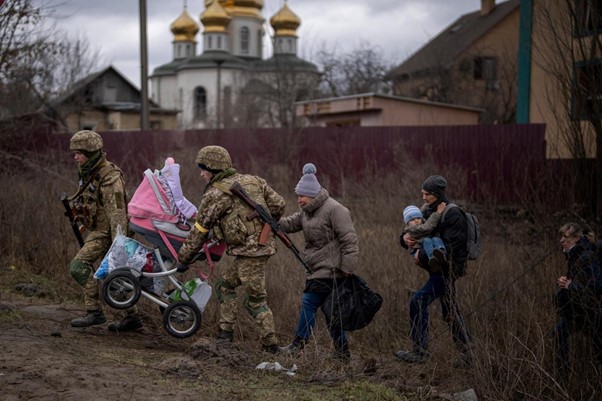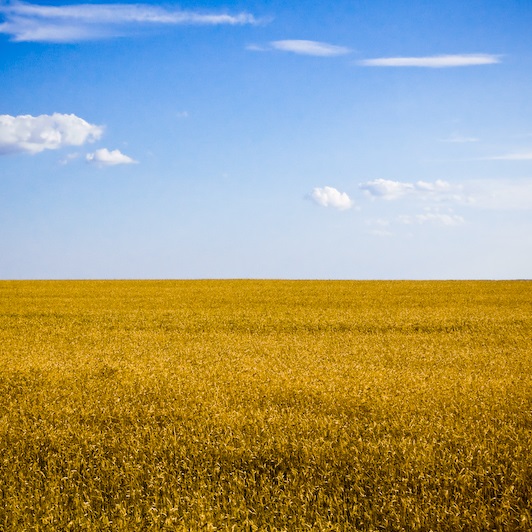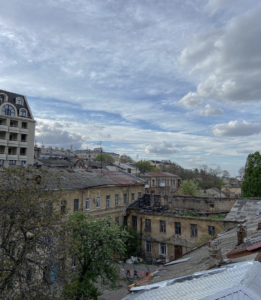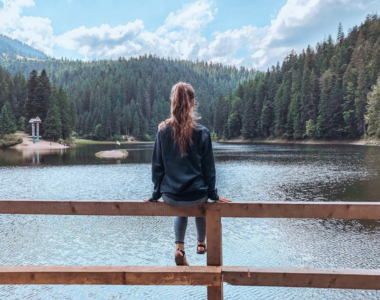Maria Ivaniv is a doctoral student at the University of St. Michael’s College’s Faculty of Theology, with a particular interest in the Metropolitan Sheptytsky Institute of Eastern Christian Studies. Her research focuses on the participation of the Ukrainian Greco-Catholic Church at Vatican II and its reception of the council in North America. She holds ReMA, MA, and STL degrees in theology and religious studies from the Catholic University of Leuven, Belgium, and MA and STB degrees in theology from the Ukrainian Catholic University. Maria was a lecturer at Three Holy Hierarchs Kyiv Theological Seminary (Kyiv, Ukraine), a teaching assistant in the Theology Department at the Ukrainian Catholic University (Lviv, Ukraine), and served as Secretary of the Patriarchal Commission for the Laity of the Ukrainian Greco-Catholic Church (Lviv, Ukraine).
God is With My People

No one has greater love than this, to lay down one’s life for one’s friends. (John 15:13)
It is very difficult—even painful—for me to write these lines. It took me almost three weeks to put on paper thoughts that were on my heart during this time. Therefore, this text is rather a self-reassurance that God is with my people in this horrible time of war.
As I write, the third week of the war in Ukraine is coming to an end. During these days, I constantly follow the news, cry, and pray for my family, friends, and all the Ukrainians trying to survive the bombing and shelling of peaceful cities. As of today, thousands of civilians have been killed, including more than 90 children, and more than two million refugees (mostly women, children, and elderly people) have had to leave their homes/country to save their lives. Hundreds of schools, hospitals, private and historical buildings, and a dozen churches have been destroyed. This is a catastrophe, both humanitarian and of values.
War is a very difficult time. We see a lot of evil, anger, lies, and destruction—and it is so easy to be consumed by all that is going on and forget that God can transfigure these events into something good. We can be active participants in that. During these three weeks, I have been thinking and praying about these things, and I distinguished three moments that are vividly visible now.
Truth. When evil shows its face so brazenly, we can clearly see where the truth is and where there are lies. The Russian government and aggressors use lies everywhere: news, social media, official speeches, church preaching. They call war a “special operation,” invasion and shelling “support and protection” of Russian-speaking Ukrainians, and killing of innocent civilians humanitarian help. We have a popular saying in Ukraine, which derives from John 8:44, and that is that the devil is the father of lies. I agree with this because I am convinced that this war also has a spiritual character. Ukrainians clearly see that they are standing on the side of the Truth. They know they are protecting their homeland, their families, and all that is so dear to their hearts, and that this is the right and truthful thing to do. I am sure that this standing in Truth will help us to win this war.
Unity. Since the first days of the war and the Russian invasion, I have been able to see clearly how united Ukrainians are. This unity is present on many levels. During these days, volunteers in Ukraine and around the globe are organizing humanitarian aid, financial support, psychological help, and many other things. People are united in defending their homeland, in receiving those who left their homes to save their children’s lives, in prayers for peace and victory of the Truth. This unity is not only about Ukrainians—people from different countries around the world are gathering food, clothing, medical supplies, and hosting Ukrainian refugees. This global human unity reminds me of the unity of God in the Holy Trinity.
Love. “No one has greater love than this, to lay down one’s life for one’s friends.” (John 15:13) This verse is the best way to describe the service and dedication of Ukrainian soldiers, volunteers, and all the people who are protecting their homeland. In the first days of the war, a young soldier died in the act of blowing up a bridge to stop the Russian army. A few Ukrainian pilots took enemy fire on themselves to save other pilots. Under the shelling of Russian occupants, volunteers are evacuating civilians and bringing food and water. Love and not anger is the force which is behind all these actions. I cannot deny that there is anger too, but it is rather a reaction to all the atrocities and destruction. Love opens borders and doors for the Ukrainian refugees, saves the lives of POWs, and helps in multiple ways. Love also manifests itself in prayers for those who blindly or consciously came to kill Ukrainians, so that their hearts and eyes would open and that they realize that they are doing terrible things, and return safely home to their families.
Truth, unity, and love are direct signs of God’s presence and are part of his revelation among his people. When I see their presence amid all the suffering, pain, and destruction, I see God’s presence within his people. I do not know how long this war will go on, but I am sure that evil will not prevail because God “is a shield for all who take refuge in him.” (Ps. 18:30)
The University of St. Michael’s College invites members of our community to support one of the many charitable aid agencies engaged in assisting refugees and victims of the conflict, including the Red Cross and Development and Peace/Caritas International.
Read other InsightOut posts.
Angelika Garvey is a fourth-year student at the University of St. Michael’s College double majoring in Book and Media Studies and Sociology. She is currently working as a social media marketing manager and event coordinator. An active volunteer, she helps in non-profit charity organizations, teen camps, and takes part in missionary and humanitarian type aid trips. She is flying to Poland today to help with refugee work at the border.
Victory Through Love
When thinking about my upcoming humanitarian trip to assist Ukrainian refugees at the Polish border, the thought of my loved ones who are standing for peace in Ukraine against Russian military aggression encourages me to help strangers escaping for a chance to live.
Born in the city of Odesa, Ukraine, I spent my childhood enjoying the life of a small city and my teen summer years by the beautiful shore of the Black Sea. I was planning to go to Ukraine this month to help at teen camps and local churches, and to visit my family and friends. But on February 24 at around 5 a.m. my plans changed as the Ukrainian community woke up to the unprecedented news of Ukraine being under a state of war. Russian militaries illegally invaded Ukrainian territories—killing innocent citizens and destroying cities, and bombing universities, hospitals, playgrounds, and a Holocaust memorial.
It was around 10 p.m. EST when I received a text from my grandpa in Ukraine that said, “They are bombing our city and there are six missile strikes on our military units so far.” Shocked, scared, lost, and hoping for all of this to be a nightmare, I found at that moment that all I could do was pray for peace. Thankfully, at that time, I was with friends, some of whom are Ukrainian and have families and friends still living in Ukraine. As we said “Amen,” I received a text saying, “It is quiet now,” from my grandpa. At that moment, joy filled the emptiness within and around the room as we all tried to process this horrific event.
The support of community is vital in such awful moments. It is hard to imagine how difficult it is for one to be alone when watching your family, friends, and home country go through a war. To encourage others going through dismal times of distress, Ukrainian students at U of T were kind enough to share their experiences of coping with others.
“The past week has been the darkest time of my life,” shares Alina Orlova, a Ukrainian majoring in Slavic Languages and Literatures. She continues, “My family and friends are under bombardment. Some of them had to flee the country, and I have spent every minute in fear for their life and well-being. At times, I feel helpless and guilty as I am not with them and cannot physically help. All I can do is support our close ones, raise awareness, and collect humanitarian aid.
“In the past week, I prayed more than I had ever had in my life. I stay hopeful—I believe in our army and people, and I cannot wait for this brutal war to be over so thousands of Ukrainian families can be reunited once again.
“During the chaos, as we barely sleep, eat, or do things as we did before, all we really can do is spread truth about the war to as many people as possible and continue to help in ways that we can. I am endlessly grateful to all people who donate and volunteer right now. Even though your fight is not on the frontline, you save thousands of people’s lives with your contribution,” she says.
Alina also says that the university staff and professors from U of T Slavic Studies “were all extremely supportive and understanding.” She believes that the “professors are also touched by this war and are trying to help their students get through these difficult times. I even received an email from Associate Professor Taras Koznarsky informing students about donation possibilities and resources of help, which made realize that I am not alone in this fight.”
Indeed, we can testify that the support of community around the university and St. Mike’s, which condemned “the unprovoked and unsanctioned invasion of Ukraine” and encouraged everyone to stand “alongside with the Ukrainian community to pray and fast for peace,” is extremely vital during such traumatizing events. Knowing you are not alone facing these troubles brings hope and encouragement to continue focusing on making a difference.
Marta Perehinets, who is part of the Ukrainian Students Club, believes in the significance of educating society on the war. She shares that “USC has been working to promote ways in which the student body can help, like by fundraising, and holding rallies on social media. Despite the ongoing pandemic, the USC also organizes conferences with professors to discuss the historical context to enlighten anyone interested in Ukrainian culture and history.”
Although it is incredibly difficult to remain peaceful as we continue our lives here in Canada, it is inspiring to see universities, staff, and students—local as well as abroad—unite together from all over the world in helping the Ukrainian community go through this terrible crisis. As we keep receiving testimonies and miracles from those in Ukraine through people all over the world, we hope for an “end to the war, and the return of peace, security, and democracy” in Ukraine and across nations.
By uniting our strengths and showing love to our neighbours, we can each provide help from wherever we are to those who need it the most right now. And the world needs it more than ever. After all, we are not strangers. We are all one.
The University of St. Michael’s College invites members of our community to support one of the many charitable aid agencies engaged in assisting refugees and victims of the conflict, including the Red Cross and Development and Peace/Caritas International. A service of prayer for Ukraine will be held at St. Basil’s Collegiate Church this Thursday, March 10 at 1:30 p.m.
Read other InsightOut posts.
The University of St. Michael’s College and the Pontifical Institute of Mediaeval Studies strongly condemn the invasion of Ukraine. The ongoing attacks by Russia are unwarranted, unprovoked, and unacceptable.
We offer prayers and deepest sympathy to the people of Ukraine and to our Ukrainian colleagues, students, and graduates as they await word from friends and family affected by the escalating tension and violence.
Pope Francis has declared Ash Wednesday (March 2) a day of fasting and prayer for peace in Ukraine. The St. Michael’s community is invited to gather at St. Basil’s 1:30 Mass for that purpose.
As a university with proud links to Ukraine through the Metropolitan Andrey Sheptytsky Institute of Eastern Christian Studies, our community is deeply concerned and sends the Ukrainian people our support and earnest hopes for a peaceful resolution.
We understand that the invasion of Ukraine by Russian armed forces is distressing for the entire St. Mike’s community. Please remember that support is available. Students can find a list of resources on our website or email the Registrar’s office ask.smc@utoronto.ca. Faculty and staff can access support services by calling: 1-800-663-1142.
Read the ACCUC statement on the Russian invasion of Ukraine.
The Association of Catholic Colleges and Universities in Canada (ACCUC) is both dismayed and horrified to learn of the unprovoked and unsanctioned invasion of Ukraine by Russia.
This illegal invasion has already resulted in needless violence, displacement, and death. The conflict is escalating quickly resulting in further casualties and destruction. At this dire hour, the ACCUC stands with the people of Ukraine and offers our prayers for an immediate resolution to this conflict. We call upon the Russian government to cease its incursion into Ukraine and return to Russian territory forthwith. We also call upon both parties to meet at the negotiation table and discuss a peaceful solution in the spirit of good faith. It is our prayer that a resolution be achieved that will preserve human life and dignity.
In the Beatitudes, Our Lord Jesus Christ, the Prince of Peace taught that those who promote peace are truly the children of God. We must all be children of God by constantly turning away from all forms of violence and war. We invoke St. Francis of Assisi asking him to pray to God so that all people are made instruments of peace.
About Us
The Association of Catholic Colleges and Universities in Canada (ACCUC) is an organization of nearly 20 postsecondary academic institutions located across all parts of Canada. ACCUC acts as the official voice for Catholic higher learning in Canada, as it seeks to spread “the spirit of learning” throughout the country.
Sincerely,
Peter Meehan, Ed.D.
Chair, ACCUC
President and Vice-Chancellor, St. Jerome’s University, Waterloo
John Cappucci, Ph.D.
Vice-Chair, ACCUC
Principal and Vice-Chancellor, Assumption University, Windsor
Christopher Adams, Ph.D.
Immediate Past Chair, ACCUC
Rector, St. Paul’s College, Winnipeg
Chantal Beauvais, Ph.D.
Rectrice, Université Saint Paul/Saint Paul University, Ottawa
Shawn Flynn, Ph.D.
President, St. Joseph’s College, Edmonton
Lauretta Frederking, Ph.D.
President, Brescia University College, London
Sami Helewa, S.J., Ph.D.
President, Campion College, Regina
Michael Higgins, Ph.D.
Principal, St. Mark’s College, Vancouver
President, Corpus Christi College, Vancouver
Most Rev. Wayne Kirkpatrick
CCCB Liaison to ACCUC
Bishop of Antigonish
David Malloy, PhD
President, King’s University College, London
Dawn Russell, Q.C.
President and Vice-Chancellor, St. Thomas University, Fredericton
Carl Still, Ph.D.
President, St. Thomas More College, Saskatoon
David Sylvester, Ph.D.
President and Vice-Chancellor, University of St. Michael’s College, Toronto
Gerry Turcotte, Ph.D.
President and Vice-Chancellor, St. Mary’s University, Calgary
Jason West, Ph.D.
President, Newman Theological College, Edmonton
Thomas Worcester, S.J., Ph.D.
President, Regis College, Toronto
Read a statement from the University of St. Michael’s College on Russia’s invasion of Ukraine.



